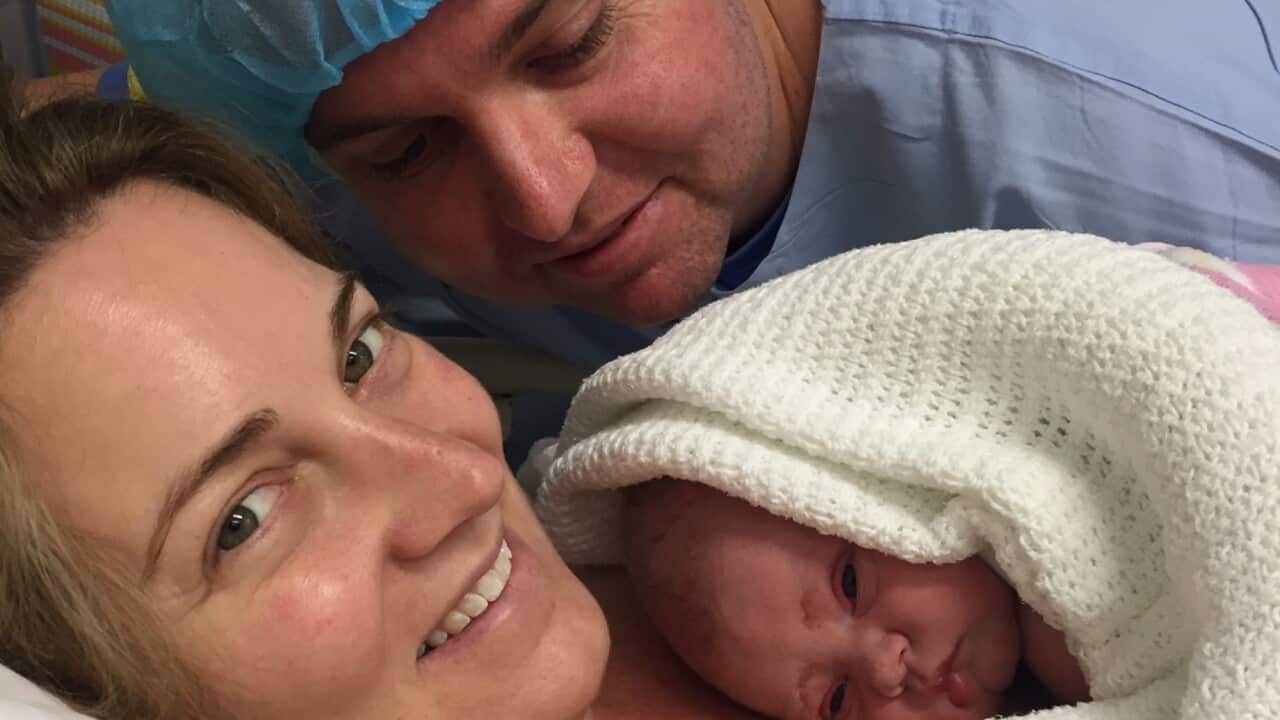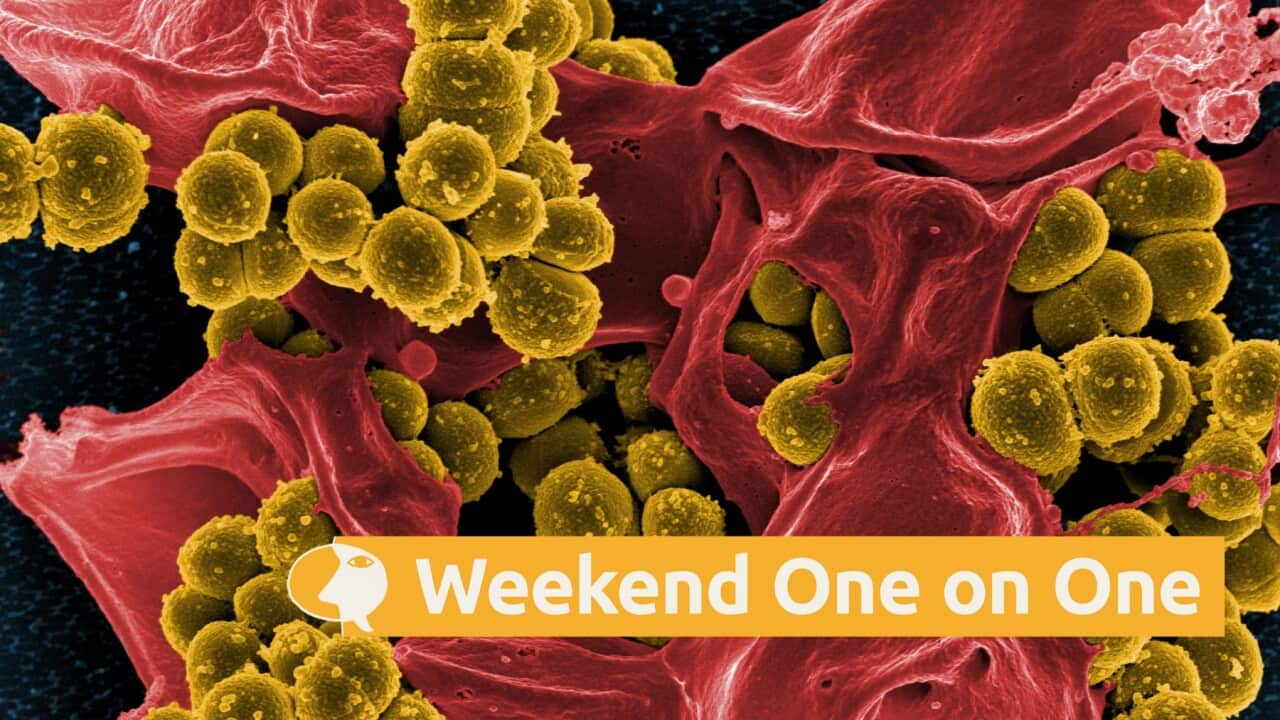Listen to Australian and world news, and follow trending topics with SBS News Podcasts.
TRANSCRIPT
"Pregnancy was a very, it was a very isolating experience. Because I was depressed and low throughout it, I felt a real sense of shame around not experiencing pregnancy like you think you should."
That was Lisa Fox - a 44-year-old mother based in the Central Coast of New South Wales.
She recalls experiencing poor mental health during the perinatal period when she was pregnant and gave birth to her son 10 years ago.
While Lisa was already seeing a psychiatrist and psychologist for a pre-existing mental health condition, she says she was never introduced to specific perinatal support.
Lisa says she felt isolated and disconnected during her pregnancy and in the 12-18 months after she gave birth to her son Luka.
"And in fact, you know, at about 4 months I had about 5 weeks in a mental health facility to support me. And just that shame that comes with that, and how shame leads to isolation, which is so detrimental to how you can lift yourself out of these things."
New research by not-for-profit perinatal mental health organisation, the Gidget Foundation, has found a quarter of Australians experiencing perinatal mental health issues are not seeking help.
This month's survey of over 1,600 Australians found one third of people believed their symptoms were not serious enough.
Gidget Foundation clinical psychologist and team manager, Katie Peterson says this is due to a lack of awareness around the signs and symptoms of poor perinatal mental health.
"I think it's got to do with people maybe not quite understanding what the difference is between maybe a mental health disorder and what are the different challenges around adjusting to becoming a new parent. Because there are a lot of factors in the perinatal period that we would consider risk factors for why people would go on to develop a mental health disorder. I guess what we know though is that early intervention is the best. So instead of waiting for someone to be kind of more at a serious or severe end, we really want people engaging with professional support early on."
Ms Peterson explains some of the risk factors for mental health issues associated with the perinatal period.
"People are having to adjust to, especially mums, they're going through significant changes hormonally, emotionally, physically, as well as in their social roles. So there's a lot of things that new parents are having to navigate. But we also see new parents might experience birth trauma. They may experience perinatal loss, some parents may have health complications for themselves or for their baby. So it's just a time where things can go wrong sometimes, I guess. And it adds to the extra stresses."
Shame and stigma also play a role in preventing people from seeking appropriate help.
Chief executive of perinatal mental health organisation PANDA, Julie Borninkhof, explains.
"We know still that people in this country, especially our mums fear raising a conversation about vulnerability because they expect then that the system and community will say 'you're not fit to parent'. And we still hear from callers that they are concerned that people are going to want to take their bubs off them and say 'you're not fit to parent'. And that gets in the way of help-seeking behaviour."
Lisa believes access to tailored perinatal mental health tools would have helped her navigate feelings of shame she experienced at that time.
"Having perinatal specific support I think is crucial for women because even... I was seeking a private psychologist and psychiatrist and didn't receive the sort of fullness of support you can receive when you're going through pregnancy and giving birth. And I think also from that what I really learnt, is that you need to advocate. It's difficult but advocate for your own needs. You can move on, and find other professionals to support you."
Connecting with and speaking to other mothers during her son's toddler years became a crucial support in how Lisa navigated her mental health.
"And for me, I think this is a key thing around the isolation that exists in this period, is that you really internalise that this is just me. This is just me, it's my fault, I can't cope. But when you do spend time with other women that are going through the same thing, you can say, oh yeah, okay, isn't just me, this is a universal thing that's going on. This is sleep deprivation. This is just really, really hard."
Ms Peterson agrees that reducing isolation and creating shared communities is key to improving individuals' access to mental health care.
"A lot of parents do need to hear the story from someone who kind of have has lived experience of that, of perinatal mental health. And then I guess they may start to relate to that story and see that for themselves. And then by realising that they're not alone, it really does reduce the shame and the stigma around reaching out to mental health services."
Financial pressures also contribute to people avoiding professional support, with data from The Gidget Foundation noting 47 per cent of those surveyed relied heavily on bulk billing appointments during the perinatal period, and 27 per cent saying they couldn't afford to seek help.
People from culturally and linguistically diverse backgrounds, as well as First Nations people, may also confront added cultural and language barriers - as Ms Peterson explains.
"We know that there can be delays in accessing culturally appropriate services, accessing interpreters, and sometimes people from a multicultural background or culturally and linguistically diverse families may find navigating services a little bit tricky or not culturally appropriate. As well as Aboriginal and Torres Strait Islander families, there is an increase in the likelihood of perinatal mental health challenges and again, it's about finding the right supports that are culturally appropriate."
Fathers also often feel excluded from perinatal mental health services - with only just over 5 per cent of PANDA's helpline callers men, despite men making up 14 per cent of the mental health checklist users.
This is something Ms Borninkhof calls the 'Dad gap'.
"I think there's still a significant stigma around the fact that men feel that they have to be the rocks in the family, and we often spend time talking about the fact that even rocks crumble. And I think that services are still behind the eight ball in terms of supporting dads in this country. There's a real resurgence and growth in dads support, but they're still being built because the investment from the funders and the government isn't there because we've been so focused on mums."
Lisa says whole communities need to be aware of the support they can provide new parents.
"I really do think that it's a community responsibility. It's family, friends, it's workplaces, to understand the support services that are out there. It shouldn't just be the mum that's struggling who then needs to work out they need help - that everyone's aware of it."













